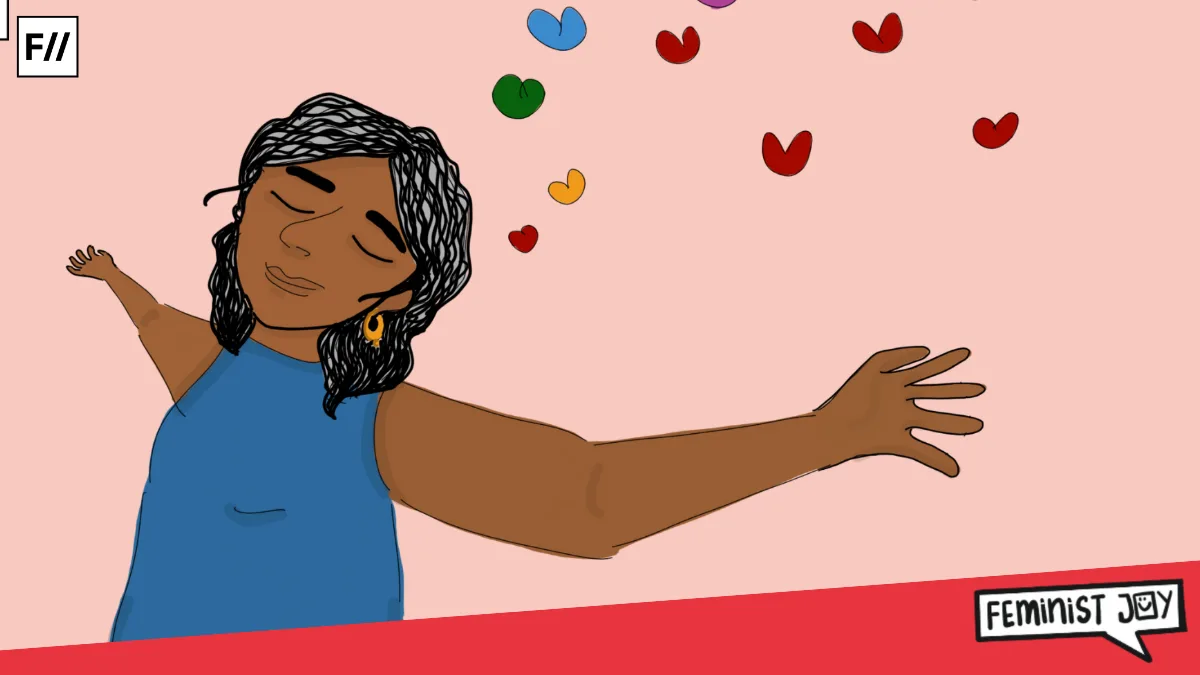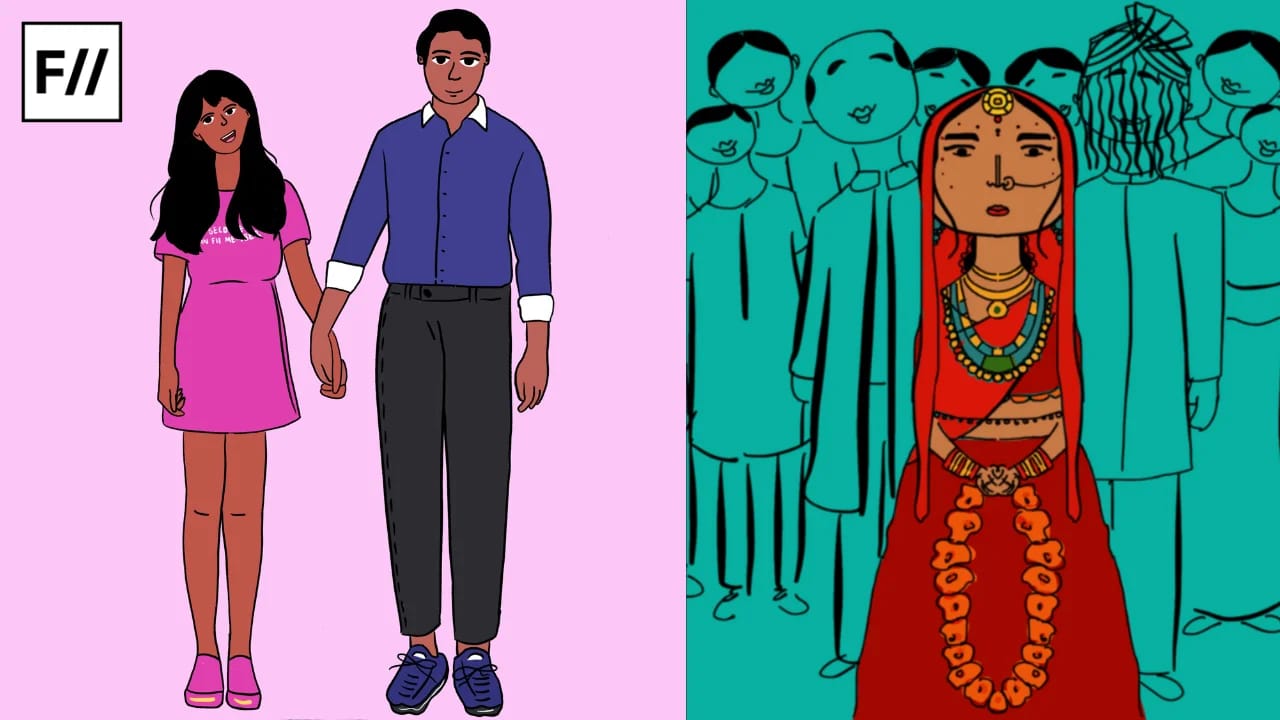Editor’s Note: FII’s #MoodOfTheMonth for August, 2021 is Digital Realities. We invite submissions on the many layers of experiences from the virtual world throughout the month. If you’d like to contribute, kindly email your articles to sukanya@feminisminindia.com
He nonchalantly tucked the card under the netted covering. I stood exasperated at the thought of needing to fight the stubbornness of this seventy year old gentleman in the face of this unprecedented scenario.
Just as we were not prepared to box up childhood in two by two Zoom squares, we were perhaps never prepared to see our parents go online, not out of necessity at least. By ‘we’, I definitely mean this perplexed generation of ours, hanging somewhere in the middle, playing the helpless fixers all the time.
Thus, I stood there realising how redundant and nostalgic the ideas that have hung around this age group are, who smell of the past, while new and happening changes have been a monopoly of the youth. Now, when the situation demands that we adapt to the eccentricities of time, we have both found ourselves nervous, irritated and perplexed by the urgency to follow suit, as well as lead our parents on.

It reminds me of those strange winter days when almost the entire country could be found in long queues near the ATMs, a time my father was first acquainted to an Android phone. The house help at my parents’ place, an aged woman with no knowledge of numbers, dangled an ATM card before me, asking for help.
After tutoring her about the uses and abuses of an ATM pin, I requested her to memorise the pin like a pattern which she had to match to the keys on the machine. She preferred to borrow money from Maa, who preferred to borrow money from me. However, Baba baptised himself in the new system; he enthusiastically learned online banking passwords, transactions, form filling-ins etc., and even helped me with all the nitty-gritties. But he blatantly refused to buy vegetables and fish from anywhere but the nearby bazaar.
The exhaustion from the loss aggravates when one must go on living with a lingering anticipation of death, a lonely death at that. I tried to imagine how they must bear with this compulsive mandate of keeping pace with change, when all one wants from life at this point is to either slow down or live by one’s own terms
Staying put at my natal place has had its perks; I have seen people age. However, I have never found myself conscious of it in the way I am now, post the pandemic lockdowns. The almost unflagging enthusiasm in these people I have grown amongst, has given way to a strange stubbornness, and exhaustion.
As protocols and stipulations make staying at home necessary, the familiar becomes a burden for them, while the unfamiliar- the rituals of masks, sanitisers, social distancing and online capacity building- a compulsive strain.

Of course, let’s not gloss over the fact that this need has deepened differences associated with access, capacities, and abilities. As a large portion of senior citizens find themselves harshly cut off from negotiation with the present demands for keeping up with the pace of new change, for many others, this impingement on choice, on freedom, has been stifling.
For Meshomashai, who is my neighbour, this situation has meant the removal of the rickety, abandoned table, on which he perched in the mornings and evenings to feed stray cats and dogs and had chit-chats with passers-by, from the front door of the closed garage down the road. ‘It’s a loss at this age’, he tells me, a loss that accumulates with the ticking of the clock, a loss that cannot be compensated by an online life.
Also read: A Ray Of Hope For The Elderly During The Pandemic
The exhaustion from the loss aggravates when one must go on living with a lingering anticipation of death, a lonely death at that. I tried to imagine how they must bear with this compulsive mandate of keeping pace with change, when all one wants from life at this point is to either slow down or live by one’s own terms.
My friend’s mother loves to travel alone. After losing her husband she believes the exhaustion of loss and grief would go away once she is able to venture out. She is waiting to live past this nagging sense of being comorbid, the need to adapt to a harrowing ‘safe’ life.

My mother, who has always been comfortable within her home, now finds it suffocating because of this compulsion to stay indoors, choked by the unfree air. I guess we are a more locked-up generation, fondly sharing messages and memes of how social distancing has always been a way of life, comfortable with n-number of ‘friends’, or ‘followers’ on our ‘social’ accounts.
Not that this must be overhauled, it’s a way of life we have created, imbibed and participated in out of choice, mostly. But to think that such a life can compensate the stunted joys of those who have always moved around, touched, felt, laughed, cried and gossiped together, might be too much to ask for. How else does one then deal with this compulsion to stay safe if not by adopting a newer, limited mode of expression? The answer isn’t easy; the war is, thus, on.
Now, when social distancing demands standing at the balcony and looking down to almost empty roads, it becomes too difficult to not think of losing grip on life. With medicines out of stock, facilities shrinking, prices rising, interest rates dropping, what is the reassurance of safety that an online life can bring, I wonder
But the ones with no resort have given in to the demands of time. While the hapless sing Que sera sera(Whatever will be, will be), the ones with privilege have tried to learn. As the pandemic has been erratic with the opening and closing of national and international borders, parents perpetually waiting for their faraway children have found some relief via online media.

Although this staying-in-touch never touches levels of gratification, it offers crumbs that help to go on. Crumbs are also plenty for those who witness how their children and grandchildren’s lives have been strapped to the computer screens, where work from home goes on endlessly.
‘Keu kotha bolena’, no one talks, is what my mother-in-law complains. This home, which is now shredded into offices, schools, and a full-time kitchen, seems to have exhausted its limits to contain, and perplexes the aged more than ever, since home was the refuge they had built bit by bit, just as they did with social relationships.
Now, when social distancing demands standing at the balcony and looking down to almost empty roads, it becomes too difficult to not think of losing grip on life. With medicines out of stock, facilities shrinking, prices rising, interest rates dropping, what is the reassurance of safety that an online life can bring, I wonder.

This is perhaps why the elderly must be stubborn in letting life flow, without allowing too much of helplessness to settle in. May be this is why they still go to the vegetable market, stand outside their gates to feed stray dogs, give adda in the evenings from behind the gates of their houses.
It is in the doing of the act that they can stand resilient to the extravagant demands of the times, demands which have been aggravated by an insensitive, incompetent state and its complete breakdown at the face of emergency. When my parents and my elderly neighbours had to stand in long queues at the crowded health centers for long hours to receive their vaccinations, they knew nothing much had changed about their struggles for existence.
They knew their demands as citizens are as old as themselves, and the exasperation at their unfulfillment as aged as them. Hence the fight has to be on. They know that the online life is an extravagant detour they can very well do without. It can never compete the sensuousness that life offers, the sensuousness which has settled within the folds of their wrinkles.
They will stay strong with or without, and we will always derive life force from them. They will become trees, their shade always a reliable canopy, their endurance and adaptability, a lesson for us.
Also read: Plants, Pandemic And Children: Discovering The Joys Of Gardening With A Six Year Old
Featured Image: Ritika Banerjee for Feminism in India
About the author(s)
Priyanka Chatterjee is a mother, researcher, and academic. She lives and writes from Siliguri. Her articles have appeared in Feminism in India, LiveWire, Himal Southasian, Sikkim Express, among others. She can be reached at site.surferpc@gmail.com and is on Instagram @priz_chatt





